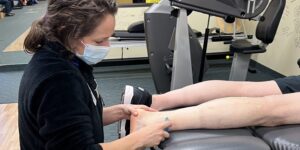
Whether you’re recovering from an injury, surgery, or a chronic condition, physical therapy can play a crucial role in your rehabilitation process. In this blog post, we’ll discuss what to expect when participating in physical therapy, so you can feel more comfortable and confident in your journey toward recovery.
Physical Therapy Evaluation
The first step in starting physical therapy is an assessment and evaluation by a licensed physical therapist. During this initial consultation, your physical therapist will ask about your medical history, current symptoms, and goals for therapy. They will also perform a physical examination to evaluate your range of motion and strength, as well as perform special tests to help form a diagnosis. Each evaluation will typically focus on one body region.
Based on this assessment, your physical therapist will develop an individualized treatment plan to address your specific needs and goals.
Physical Therapy Treatment Sessions
Once your treatment plan is established, you will begin regular physical therapy sessions. During each session, you will be guided through specific activities that help address your impairments. You should expect education throughout this process, with feedback on your form, movement compensations, or cues to help improve coordination. Your therapist may also use manual therapy to reduce joint or muscle tightness.
Progression of Exercise
You should expect your treatment plan to evolve over time as your condition improves and your physical therapist will adjust your exercises and techniques accordingly.
Most often, initial exercises will seem a bit boring and may not seem important. This is because PT focuses on correcting subtle imbalances that cause injury. As these issues are corrected, your exercises will progress to more functional and challenging tasks!
Expectations for Progress
Physical therapy is a gradual process that requires time and patience. You may not notice significant improvements in your condition after just a few sessions, but you should expect to see progress over time with consistent effort and dedication. Your physical therapist will work with you to establish realistic goals and expectations for your treatment. They will also provide you with exercises and techniques to perform at home to manage your condition long term.
Communication and Feedback
Effective communication and feedback are critical components of a successful physical therapy experience. You should feel comfortable asking questions and sharing any concerns with your physical therapist. They can work with you to adjust your treatment plan and techniques to ensure that you’re getting the most out of each session.

It’s also important to provide your physical therapist with regular feedback on your progress and any changes in your symptoms or condition. This can help them adjust your treatment plan and techniques as needed to optimize your recovery.
